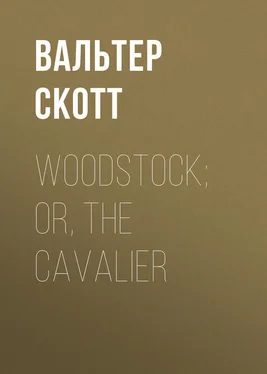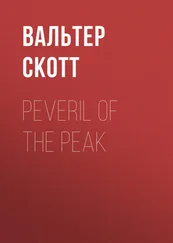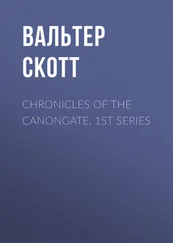Вальтер Скотт - Woodstock; or, the Cavalier
Здесь есть возможность читать онлайн «Вальтер Скотт - Woodstock; or, the Cavalier» — ознакомительный отрывок электронной книги совершенно бесплатно, а после прочтения отрывка купить полную версию. В некоторых случаях можно слушать аудио, скачать через торрент в формате fb2 и присутствует краткое содержание. Жанр: foreign_antique, foreign_prose, Альтернативная история, на английском языке. Описание произведения, (предисловие) а так же отзывы посетителей доступны на портале библиотеки ЛибКат.
- Название:Woodstock; or, the Cavalier
- Автор:
- Жанр:
- Год:неизвестен
- ISBN:нет данных
- Рейтинг книги:5 / 5. Голосов: 1
-
Избранное:Добавить в избранное
- Отзывы:
-
Ваша оценка:
- 100
- 1
- 2
- 3
- 4
- 5
Woodstock; or, the Cavalier: краткое содержание, описание и аннотация
Предлагаем к чтению аннотацию, описание, краткое содержание или предисловие (зависит от того, что написал сам автор книги «Woodstock; or, the Cavalier»). Если вы не нашли необходимую информацию о книге — напишите в комментариях, мы постараемся отыскать её.
Woodstock; or, the Cavalier — читать онлайн ознакомительный отрывок
Ниже представлен текст книги, разбитый по страницам. Система сохранения места последней прочитанной страницы, позволяет с удобством читать онлайн бесплатно книгу «Woodstock; or, the Cavalier», без необходимости каждый раз заново искать на чём Вы остановились. Поставьте закладку, и сможете в любой момент перейти на страницу, на которой закончили чтение.
Интервал:
Закладка:
"Ephraim," answered the fellow, with an affected twang through the nose.
"And what besides Ephraim?"
"Ephraim Cobb, from the goodly city of Glocester, where I have dwelt for seven years, serving apprentice to a praiseworthy cordwainer."
"It is a goodly craft," answered the officer; "but casting in thy lot with ours, doubt not that thou shalt be set beyond thine awl, and thy last to boot."
A grim smile of the speaker accompanied this poor attempt at a pun; and then turning round to the corporal, who stood two paces off, with the face of one who seemed desirous of speaking, said, "How now, corporal, what tidings?"
"Here is one with a packet, an please your Excellency," said the corporal – "Surely my spirit doth not rejoice in him, seeing I esteem him as a wolf in sheep's clothing."
By these words, Wildrake learned that he was in the actual presence of the remarkable person to whom he was commissioned; and he paused to consider in what manner he ought to address him.
The figure of Oliver Cromwell was, as is generally known, in no way prepossessing. He was of middle stature, strong and coarsely made, with harsh and severe features, indicative, however, of much natural sagacity and depth of thought. His eyes were grey and piercing; his nose too large in proportion to his other features, and of a reddish hue.
His manner of speaking, when he had the purpose to make himself distinctly understood, was energetic and forcible, though neither graceful nor eloquent. No man could on such occasion put his meaning into fewer and more decisive words. But when, as it often happened, he had a mind to play the orator, for the benefit of people's ears, without enlightening their understanding, Cromwell was wont to invest his meaning, or that which seemed to be his meaning, in such a mist of words, surrounding it with so many exclusions and exceptions, and fortifying it with such a labyrinth of parentheses, that though one of the most shrewd men in England, he was, perhaps, the most unintelligible speaker that ever perplexed an audience. It has been long since said by the historian, that a collection of the Protector's speeches would make, with a few exceptions, the most nonsensical book in the world; but he ought to have added, that nothing could be more nervous, concise, and intelligible, than what he really intended should be understood.
It was also remarked of Cromwell, that though born of a good family, both by father and mother, and although he had the usual opportunities of education and breeding connected with such an advantage, the fanatic democratic ruler could never acquire, or else disdained to practise, the courtesies usually exercised among the higher classes in their intercourse with each other. His demeanour was so blunt as sometimes might be termed clownish, yet there was in his language and manner a force and energy corresponding to his character, which impressed awe, if it did not impose respect; and there were even times when that dark and subtle spirit expanded itself, so as almost to conciliate affection. The turn for humour, which displayed itself by fits, was broad, and of a low, and sometimes practical character. Something there was in his disposition congenial to that of his countrymen; a contempt of folly, a hatred of affectation, and a dislike of ceremony, which, joined to the strong intrinsic qualities of sense and courage, made him in many respects not an unfit representative of the democracy of England.
His religion must always be a subject of much doubt, and probably of doubt which he himself could hardly have cleared up. Unquestionably there was a time in his life when he was sincerely enthusiastic, and when his natural temper, slightly subject to hypochondria, was strongly agitated by the same fanaticism which influenced so many persons of the time. On the other hand, there were periods during his political career, when we certainly do him no injustice in charging him with a hypocritical affectation. We shall probably judge him, and others of the same age, most truly, if we suppose that their religious professions were partly influential in their own breasts, partly assumed in compliance with their own interest. And so ingenious is the human heart in deceiving itself as well as others, that it is probable neither Cromwell himself, nor those making similar pretensions to distinguished piety, could exactly have fixed the point at which their enthusiasm terminated and their hypocrisy commenced; or rather, it was a point not fixed in itself, but fluctuating with the state of health, of good or bad fortune, of high or low spirits, affecting the individual at the period.
Such was the celebrated person, who, turning round on Wildrake, and scanning his countenance closely, seemed so little satisfied with what he beheld, that he instinctively hitched forward his belt, so as to bring the handle of his tuck-sword within his reach. But yet, folding his arms in his cloak, as if upon second thoughts laying aside suspicion, or thinking precaution beneath him, he asked the cavalier what he was, and whence he came?
"A poor gentleman, sir, – that is, my lord," – answered Wildrake; "last from Woodstock."
"And what may your tidings be, sir gentleman ?" said Cromwell, with an emphasis. "Truly I have seen those most willing to take upon them that title, bear themselves somewhat short of wise men, and good men, and true men, with all their gentility; yet gentleman was a good title in old England, when men remembered what it was construed to mean."
"You say truly, sir," replied Wildrake, suppressing, with difficulty, some of his usual wild expletives; "formerly gentlemen were found in gentlemen's places, but now the world is so changed that you shall find the broidered belt has changed place with the under spur-leather."
"Say'st thou me?" said the General; "I profess thou art a bold companion, that can bandy words so wantonly; – thou ring'st somewhat too loud to be good metal, methinks. And, once again, what are thy tidings with me?"
"This packet," said Wildrake, "commended to your hands by Colonel Markham Everard."
"Alas, I must have mistaken thee," answered Cromwell, mollified at the mention of a man's name whom he had great desire to make his own; "forgive us, good friend, for such, we doubt not, thou art. Sit thee down, and commune with thyself as thou may'st, until we have examined the contents of thy packet. Let him be looked to, and have what he lacks." So saying the General left the guard-house, where Wildrake took his seat in the corner, and awaited with patience the issue of his mission.
The soldiers now thought themselves obliged to treat him with more consideration, and offered him a pipe of Trinidado, and a black jack filled with October. But the look of Cromwell, and the dangerous situation in which he might be placed by the least chance of detection, induced Wildrake to decline these hospitable offers, and stretching back in his chair, and affecting slumber, he escaped notice or conversation, until a sort of aide-de-camp, or military officer in attendance, came to summon him to Cromwell's presence.
By this person he was guided to a postern-gate, through which he entered the body of the Castle, and penetrating through many private passages and staircases, he at length was introduced into a small cabinet, or parlour, in which was much rich furniture, some bearing the royal cipher displayed, but all confused and disarranged, together with several paintings in massive frames, having their faces turned towards the wall, as if they had been taken down for the purpose of being removed.
In this scene of disorder, the victorious General of the Commonwealth was seated in a large easy-chair, covered with damask, and deeply embroidered, the splendour of which made a strong contrast with the plain, and even homely character of his apparel; although in look and action he seemed like one who felt that the seat which might have in former days held a prince, was not too much distinguished for his own fortunes and ambition. Wildrake stood before him, nor did he ask him to sit down.
Читать дальшеИнтервал:
Закладка:
Похожие книги на «Woodstock; or, the Cavalier»
Представляем Вашему вниманию похожие книги на «Woodstock; or, the Cavalier» списком для выбора. Мы отобрали схожую по названию и смыслу литературу в надежде предоставить читателям больше вариантов отыскать новые, интересные, ещё непрочитанные произведения.
Обсуждение, отзывы о книге «Woodstock; or, the Cavalier» и просто собственные мнения читателей. Оставьте ваши комментарии, напишите, что Вы думаете о произведении, его смысле или главных героях. Укажите что конкретно понравилось, а что нет, и почему Вы так считаете.












